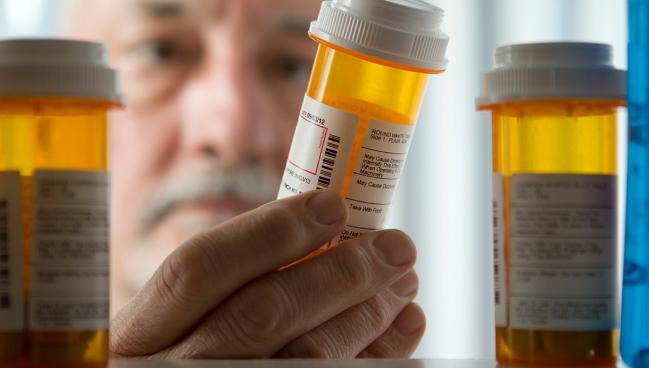COVID-PACT: Full-Dose Anticoagulation Improves Outcomes in Critical COVID-19
For less-sick patients, results from the ACT trials showed no benefits with colchicine, aspirin, or rivaroxaban plus aspirin.

BARCELONA, Spain—New results from three trials presented here at the European Society of Cardiology Congress 2022 have provided additional insights into what works—and what doesn’t—for addressing the inflammation and thrombosis behind poor outcomes in patients with COVID-19 of varying severity.
One of the studies, COVID-PACT, was positive, demonstrating that therapeutic-dose anticoagulation cut the risk of thrombotic complications in hospitalized patients receiving ICU-level care compared with anticoagulation administered at standard prophylactic doses, mostly due to a reduction in venous thromboembolism (VTE).
The Anti-Coronavirus Therapies (ACT) trials, on the other hand, let clinicians know what isn’t effective. In the inpatient study, neither the anti-inflammatory effects of colchicine nor the antithrombotic effects of a combination of low-dose rivaroxaban and aspirin improved outcomes, and in the outpatient study, colchicine and aspirin alone had no significant beneficial effects.
Commenting for TCTMD, Robert Storey, MD (University of Sheffield, England), noted that the pandemic has substantially changed since these trials were first started, with the world seeing less-severe disease overall and having the option to prevent severe disease through the use of antiviral therapies.
“Obviously, preventing the hyperinflammatory, prothrombotic state is preferable to dealing with the consequences of it because of the challenges involved with individualizing therapies when patients do get sick,” Storey said.
“Clearly, there isn’t really a case for implementing full-dose anticoagulation or aspirin or colchicine in patients at an early stage of COVID,” he noted. “And if they do progress to severe disease despite being vaccinated and perhaps because they haven’t received antiviral therapies, then one would have to individualize therapy on the basis of their thrombotic and bleeding risks, which you judge as best you can.”
COVID-PACT
The COVID-PACT results were presented by David Berg, MD (Brigham and Women’s Hospital, Boston, MA), and published simultaneously online in Circulation with Erin Bohula, MD, DPhil (Brigham and Women’s Hospital), and Berg as the lead authors.
Berg noted that the well-established link between SARS-CoV-2 infection and thrombosis is likely explained by multiple mechanisms, including activation of the coagulation cascade, systemic endothelial dysfunction, and a hyperreactive platelet response.
Multiple randomized trials have evaluated various anticoagulant and antiplatelet regimens to reduce the thrombotic risks of COVID-19, with mixed results stemming from differences in study populations, treatments, designs, and endpoints. A multiplatform RCT evaluated the impact of full-dose anticoagulation in hospitalized patients and came to differing conclusions based on the specific subset evaluated—it was beneficial in noncritically ill patients but not in those who required ICU-level care, with an endpoint encompassing the number of days alive without organ support.
“Given the disparate results of these two [cohorts], and the uncertain significance of an organ-failure endpoint, particularly in critically ill patients, for this intervention, the optimal thromboprophylaxis strategy in critically ill patients with COVID-19 has remained uncertain,” Berg said.
COVID-PACT, conducted across 34 US sites, provides more information to consider in that context. The investigators enrolled 390 patients (mean age 61 years; 41% women) who were hospitalized for COVID-19 and were either admitted to the ICU or receiving advanced respiratory support outside the ICU. The trial had to stop recruiting prematurely because of falling rates of critical COVID-19 cases.
The patients were randomized to full-dose or prophylactic-dose anticoagulation, which initially included low-molecular-weight heparin in 82% and unfractionated heparin in the rest. Patients were then randomized to either clopidogrel or no antiplatelet therapy if they were not already receiving antiplatelet therapy.
Probably we will have to revisit guidelines. Eduardo Ramacciotti
The primary endpoint was a composite of death due to venous/arterial thromboembolism, pulmonary embolism, clinically evident deep venous thrombosis (DVT), type 1 MI, ischemic stroke, systemic embolism, acute limb ischemia, or clinically silent DVT through hospital discharge or day 28 after randomization. This was reduced with full-dose versus prophylactic-dose anticoagulation (9.9% vs 15.2%), a significant difference in the primary on-treatment analysis (HR 0.56; 95% CI 0.32-0.99). A win-ratio analysis also supported an advantage for the therapeutic dose (1.95; 95% CI 1.08-3.55). Most of the benefit was attributed to a reduction in VTE, as there were few arterial events.
Clopidogrel did not have any impact on the primary outcome (HR 0.90; 95% CI 0.48-1.69).
As for safety, there were four fatal or life-threatening bleeds in the full-dose anticoagulation group and one in the prophylactic-dose group (P = 0.19). GUSTO moderate or severe bleeding, a secondary safety endpoint, was more frequent with the therapeutic dose (7.9% vs 0.5%; P = 0.002), although Berg said the difference was primary attributed to more transfusions in hemodynamically stable patients.
“Findings from COVID-PACT are relevant as consensus treatment guidelines for COVID-19 are revisited,” Berg said, noting that current guidelines suggest standard prophylactic-dose anticoagulation is sufficient in critically ill patients. “Weighing thrombotic and bleeding risk, full-dose anticoagulation should be considered to prevent thrombotic complications in selected critically ill patients with COVID-19.”
Eduardo Ramacciotti, MD, PhD (Science Valley Research Institute, Sao Paulo, Brazil, and Loyola University Medical Center, Maywood IL), the discussant following the presentation, indicated that the findings of COVID-PACT are potentially practice-changing. He’s an author of the guidelines on the antithrombotic treatment of COVID-19 from the International Society on Thrombosis and Haemostasis, which recommend against full-dose anticoagulation among patients in the ICU. “Probably we will have to revisit guidelines,” he said.
ACT Inpatient
The ACT trials were designed to evaluate the impact of treatments on two key problems in COVID-19—inflammation and microvascular thrombosis, according to Sanjit Jolly, MD (McMaster University, Hamilton, Canada), who presented the inpatient results. This trial included 2,611 hospitalized patients for the colchicine versus no colchicine randomization and 2,119 for the rivaroxaban 2.5 mg twice daily plus aspirin 100 mg/day versus neither randomization. Overall, mean patient age was about 56, and roughly 60% of participants were men.
Only about 11% of participants were fully vaccinated against COVID-19. A minority (roughly 12%) required ICU-level care, and less than 3% were receiving invasive mechanical ventilation at baseline.
The primary composite outcome for the colchicine analysis was a need for high-flow oxygen, mechanical ventilation, or death at 28 days. This occurred at similar rates in colchicine and control groups (28.2% vs 27.2%; P = 0.58), with similar findings across subgroups. None of the secondary outcomes were affected either.
For the analysis of intensified antithrombotic therapy, the primary composite outcome was similar, but added major thrombosis. Rivaroxaban plus aspirin did not reduce risk of this outcome (26.4% vs 28.4%; P = 0.32) or any of the secondary outcomes. Not unexpectedly, overall bleeding was higher with rivaroxaban plus aspirin (1.60% vs 0.66%; P = 0.042), although the difference in serious bleeding wasn’t significant (0.19% vs 0.57%; P = 0.18).
Because smaller trials have suggested a potential benefit from colchicine, the ACT investigators performed an updated meta-analysis, which showed that colchicine did not reduce rates of the primary outcome or mortality.
But adding the antithrombotic results to a meta-analysis with prior trials yielded different results. Intensified anticoagulation in hospitalized patients was associated with a significantly lower risk of VTE (risk ratio 0.57; 95% CI 0.44-0.73), but no difference in mortality (risk ratio 0.94; 95% CI 0.80-1.10).
“Colchicine was not beneficial in hospitalized patients with COVID-19, especially on a background of steroids, and should not be used,” Jolly concluded.
He said rivaroxaban plus aspirin did not provide a benefit in this trial, although the accumulated literature suggests that intensified anticoagulation will prevent VTE events in hospitalized patients. Of note, he pointed out, clinically evident VTE events were much less frequent during the study period than was reported earlier in the pandemic.
For Jurriën ten Berg, MD, PhD (St. Antonius Hospital, Nieuwegein, the Netherlands), the discussant after the presentation, the trial is “the end of the story for colchicine in COVID-19.” He said that “colchicine is probably too weak an inhibitor [of inflammation], and it’s very difficult to have an effect on top of steroids,” which most of the trial participants were already receiving.
However, it’s not necessarily the end of the line for anticoagulation and antiplatelet therapy, he said, discussing a variety of issues around patient selection and drug type and dosing that can influence the results of trials. He noted that the FREEDOM COVID trial is evaluating therapeutic anticoagulation in hospitalized patients and that other studies are assessing the impact of glycoprotein IIb/IIIa inhibitors. And it might be, ten Berg said, that P-selectin inhibitors could be a solution to the problem of microvascular thrombosis.
ACT Outpatient
John Eikelboom, MBBS (McMaster University), presented the results of the ACT outpatient trial, which enrolled 3,917 patients (mean age about 45 years; about 60% men) from 11 countries and randomized them to colchicine versus no colchicine and then to aspirin versus no aspirin.
Through 28 days of treatment, colchicine didn’t reduce the rate of hospitalization or death (3.4% vs 3.3%; P = 0.93). Likewise, aspirin didn’t significantly lessen the risk of major thrombosis, hospitalization, or death (3.0% vs 3.8%; P = 0.21). Neither treatment had a beneficial effect on any secondary outcomes.
Event rates were low overall, Eikelboom, said, noting, too, that rates fell steadily during the course of the trial despite attempts to enrich the study population, a likely consequence of the emergence of less-virulent strains of SARS-CoV-2, increasing population immunity from infection and vaccination, and changes in medical practice.
Nonetheless, “the results of the ACT outpatient trial provide no evidence for a benefit of either colchicine or aspirin,” Eikelboom said. “The severity of COVID-19 appears to be diminishing, but remember, of course, that patients continue to have severe disease and die from COVID-19. Accordingly, the situation remains unchanged. The world still needs additional inexpensive, widely applicable treatments to prevent COVID-19 disease progression.”
Discussing the outpatient results after the presentation, Alida Caforio, MD, PhD (University of Padova, Italy), said the lack of beneficial effects from the interventions could be related to the relatively young, low-risk population enrolled; the lower-than-expected event rates, possibly due to the emergence of less-lethal variants; and the influence of additional treatments like antivirals and monoclonal antibodies.
But, she said, “clearly there is no benefit for colchicine and aspirin in outpatients with undefined . . . COVID variant infection distribution.”
Caforio called for more research to identify new specific therapies, “but meanwhile we know that vaccines are very effective in preventing severe disease in populations with a high vaccination rate, so I think we should try and convince politicians and people that even in low- and middle-income countries, we should increase vaccination . . . coverage.”
Sizing Up the Clinical Implications
Regarding the colchicine findings from the ACT trials, Storey suggested that the drug simply wasn’t up to the task. Colchicine has “a rather broad, nonspecific mode of action that makes it potentially a bit of a blunt instrument in someone with viral pneumonia, particularly because it possibly might increase the risk related to bacterial pneumonia and so may have detrimental effects in patients who are sick with COVID and therefore vulnerable to bacterial secondary infection,” he said. “And that may counteract any benefit that it has in terms of reducing the inflammatory response that drives some aspects of the illness and the thrombotic complications.”
When it comes to the antithrombotic findings of the ACT trials, Storey noted that the falling event rates over time created problems in terms of statistical power. There were trends in favor of aspirin for some patients, but there weren’t enough events to assess that properly, he said. Also, aspirin is not an effective anti-inflammatory drug at prophylactic doses, so any potential protective effects it might have may have been swamped by the inflammatory response driving some of the thrombotic complications in COVID-19, Storey explained.
Moreover, any potential impact of rivaroxaban would be difficult to prove on a background of widespread use of prophylactic anticoagulation and low event rates in these patients, Storey said.
COVID-PACT, for its part, might have an impact on future guidance, he indicated, saying “it’s enough to support a recommendation to consider full-dose anticoagulation where the balance of thrombotic and bleeding risks favors it.”
Experts are continuing to develop guidance around that assessment, Storey said, but he noted that certain features like thrombocytopenia and coagulopathy might tip the balance against use of full-dose anticoagulation. In addition, prophylactic doses might be sufficient in patients with less-severe disease with limited or no evidence of systemic inflammation.
Todd Neale is the Associate News Editor for TCTMD and a Senior Medical Journalist. He got his start in journalism at …
Read Full BioSources
Jolly S. Colchicine and rivaroxaban plus aspirin in patients hospitalized with COVID-19: a factorial, randomized, open-label trial. Presented at: ESC 2022. August 29, 2022. Barcelona, Spain.
Eikelboom JW. Colchicine and aspirin in community patients with COVID-19: an open-label, factorial, randomized trial. Presented at: ESC 2022. August 29, 2022. Barcelona, Spain.
Bohula EA, Berg DD, Lopes MS, et al. Anticoagulation and antiplatelet therapy for prevention of venous and arterial thrombotic events in critically ill patients with COVID-19: COVID-PACT. Circulation. 2022;Epub ahead of print.
Disclosures
- COVID-PACT was sponsored by the TIMI Study Group.
- Bohula and Berg are members of the TIMI Study Group, which has received institutional research grant support through Brigham and Women’s Hospital from Abbott, Amgen, Anthos Therapeutics, ARCA Biopharma, AstraZeneca, Bayer HealthCare Pharmaceuticals, Daiichi Sankyo, Eisai, Intarcia, Ionis Pharmaceuticals, Janssen Research and Development, MedImmune, Merck, Novartis, Pfizer, Quark Pharmaceuticals, Regeneron Pharmaceuticals, Roche, Siemens Healthcare Diagnostics, Softcell Medical Limited, The Medicines Company, and Zora Biosciences.
- Bohula reports personal fees from Amgen, Kowa, Novartis, Novo Nordisk, Servier, Medscape, and PriMed.
- Berg reports being supported by Harvard Catalyst KL2/CMeRIT; having received consulting fees from AstraZeneca, Mobility Bio, and Youngene Therapeutics; having received honoraria from the Medical Education Speakers Network; and participating on clinical endpoint committees for studies sponsored by Kowa Pharmaceuticals.
- The ACT trials were supported by the Canadian Institutes of Health Research, Bayer AG, Population Health Research Institute, Hamilton Health Sciences Research Institute, and the Thistledown Foundation.
- Eikelboom reports honoraria and research support from Bayer AG, which also provided an unrestricted grant and in-kind support for the ACT trials.
- Jolly reports research contracts with Bayer and Boston Scientific.
- Ramacciotti reports receiving research support from Bayer, the Brazilian Ministry of Health, Esperion, Novartis, and Pfizer; consulting for Bayer, Daiichi Sankyo, Mylan, Pfizer, and Sanofi; and serving on speakers bureaus/advisory boards for Aspen, Bayer, Daiichi Sankyo, Pfizer, and Sanofi.
- Caforio reports no relevant conflicts of interest.
- Ten Berg reports advisory/consulting/speakers fees from Accumetrics, AstraZeneca, Bayer, Boehringer Ingelheim, Bristol Myers Squibb, CeleCor Therapeutics, Daiichi Sankyo, Eli Lilly, Ferrer, Pfizer, and The Medicines Company, as well as research grants from AstraZeneca and ZonMw.





Comments